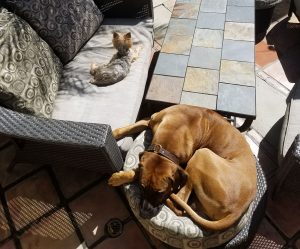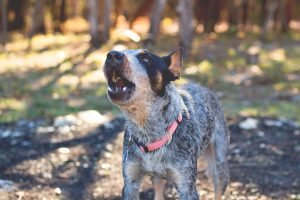Reactive dog behavior can create a lot of stress for owners. Whether you’re just trying to walk your dog down the street without an explosion of barking and lunging, or you’re trying to compete in a dog sport without a total meltdown, reactivity can be mentally exhausting for humans. I’ve noticed a question being asked among many reactive dog owners: “Did I cause his reactivity?” And it’s a question I’ve asked myself with my own reactive dog. This post is my answer to that question and the feelings of guilt and failure that can accompany it.
A Tale of Two Dogs
In 2016, my husband and I relocated our two dogs to the United States when we moved home from Malawi, Africa.
Samson, my male Rhodesian Ridgeback, who was three years old when we flew home.
Ruby, my female Rhodesian Ridgeback, who was two years old when we flew home.
My two dogs traveled 40 hours from Malawi to California, where they then encountered many dogs in their new American life.
Samson became very dog reactive, while Ruby became a social butterfly.
While it’s impossible for me to know exactly why my dogs developed different feelings about other dogs, I find it interesting that they had such similar upbringings, yet contrasted so sharply when it came to their response toward their canine counterparts.
Both dogs came from reputable breeders in South Africa and share a father. They both flew on a plane from South Africa to Malawi at a young age to come live with us. Both dogs ate the same diet, were trained using the same methods, and lived in the same home environment. Other than their experiences with littermates and adult dogs at the breeder’s home (and each other), they both met exactly two other dogs. And these encounters were well past the “critical socialization period” which ends around 14 weeks. Both of those other dogs were also Rhodesian Ridgebacks, so they didn’t get to meet dogs that looked, acted and played differently than themselves.
Perhaps you’re wondering why my dogs were not adequately exposed to other dogs during their critical socialization period? The culture of dog ownership is different in Malawi than in the United States. Many people own dogs as a security measure and they are not considered pets and are not allowed inside. Most dogs spend their lives within the walls of a home compound, or are roaming free in a village setting. This meant well-socialized dogs which I could bring my own pups around were very rare, so exposing them to other dogs wasn’t really an option. Occasionally, my dogs may have seen a few stray dogs in the distance on a walk, but they didn’t interact.

When we moved back to the United States and brought the dogs home with us, I was definitely concerned about how they would adapt to living in a much more dog-friendly world. And to top it off, we would be staying with my mother-in-law who owned an elderly Yorkie.
By some miracle, both my dogs got on well with the Yorkie. They were curious about him, but their behavior was appropriate. “Okay,” I thought, “maybe this isn’t gonna be so bad.” I was half right.
Ruby seemed to gain dog-dog skills overnight. For starters, she acted like it was no big deal when we passed other dogs on walks. A little glance, but otherwise content to keep walking. While she was unsure at first upon meeting new dogs, her shyness gave way to play bows and silly, wiggly body language.
Samson, on the other hand, was giving hard stares to dogs we passed, even across long distances. Then he started growling, lunging and barking, especially if the other dog looked at him. This was stressful for my husband and me, as he weighed almost 100 pounds.
Socialization & Reactivity
The moral of the story is: Socialization is only one piece of the behavior puzzle.
I am defining socialization as exposure to things, including other dogs, so that they develop appropriate behavior for the contexts in which they will exist. On one end of the socialization spectrum is the idea of letting your puppy meet as many other dogs as possible with lots of free play, in hopes that they become dog friendly. And at the other end of the spectrum is the idea of minimizing your dogs interactions with other dogs as much as possible so that they have no interest in other dogs. Personally, I think dogs need to learn how to interact with other dogs AND that sometimes they are off limits and an interaction is not on the table.
Certainly socialization is very important and we should do our very best to create neutral to positive experiences for our puppies during this time. But it does not guarantee anything.
When it comes to the factors that influence the behavior of our dogs, socialization, training, exercise and nutrition are within our control as owners. And then there is a host of other factors beyond our control, some of which science likely has yet to reveal to us, that contribute to how our dogs behave. Things like genetics, how their mother cared for them, experiences at the breeder’s home, how their siblings interacted with them, biology, traumatic events, health issues and more. And if you got your dog as an adult, you may not know what kind of socialization or experiences they have had before coming under your care.
I’m not surprised that Samson was dog reactive. After all, he had extremely limited exposure to other dogs for the first several years of his life. What does surprise me is that Ruby was NOT reactive. Somehow, she managed to develop perfectly appropriate dog social skills, despite receiving next to zero dog socialization.
This simply tells us that reactive dog behavior does not hinge on whether you socialized your dog well enough. I know, because I am one of them, that a lot of dog people can feel almost paralyzed about ensuring we properly socialize our puppies during that short window of time in which they are most impressionable. But when I think about Ruby, I realize I can chill out and breathe. And she’s not an anomaly – we’ve all heard of and seen dogs who grew up in rough conditions with little positive exposure to people, dogs and things and still managed to be wonderful, loving pets.
Yes, We Can Screw It Up, But You Probably Didn’t
Now, can an owner contribute toward their dog becoming reactive? Sure. Maybe if I had been able to socialize Samson to other dogs he wouldn’t have become reactive. Maybe he would have been less reactive. Or maybe it would have had no effect. But most informed owners aren’t intentionally keeping their new puppies isolated from other dogs for years of time. They will see other dogs in the neighborhood, probably meet at least a few, and learn some appropriate behavior along the way. And if you’re into dog sports, your puppy is likely being exposed to dogs in a variety of locations.
Perhaps if an owner (intentionally or unintentionally) pairs other dogs with anxious human behavior or painful consequences (some sort of aversive stimulus), a pup may come to react to dogs with growling, barking and lunging. But this goes beyond socialization and dips into the training bucket. If your owner gets worried and starts acting funny every time you encounter other dogs, your feelings about dogs might tilt toward the negative. And if your owner causes some kind of painful stimulus because you’re jumping around and pulling in your own puppy way when you see other dogs, you may begin to dislike dogs.
Don’t Blame Yourself
I’m not saying lack of socialization never contributes toward reactivity or that it can’t help prevent or lessen reactive dog behavior for an individual puppy. What I am saying is the reactivity picture is much bigger than socialization alone. For the many, many owners who are doing their best to provide some level of positive socialization for their puppies, it’s not your fault that your dog ended up reactive. Your socialization efforts helped bring out the best in your puppy and possibly even mitigated some of their reactivity. Living and loving a reactive dog is challenging enough without blaming yourself for it. Don’t take your dog’s behavior as a personal failure. Our dogs are each unique, complex creatures and there is so much more to it.
If you’re interested in learning more about the connection between genetics and behavior in dogs, check out this podcast.






This Post Has 7 Comments
Definitely a good point! I always tell my reactivity clients that they’re doing the best they can with the resources they have. And that’s all we can ask for! And a lot of them end up with happy, healthy dogs after working together. It’s fun to watch the transformation.
And… even trainers have reactive dogs. 😉
That’s so great to hear you’ve had some good success with clients with reactive dogs. It can be a tough issue to work on, so kudos to anyone that puts in the time on helping their dog through it! And yep, not even professional trainers are immune to reactivity in their own dogs.
Great post and I am not sure if you know but I was born in South Africa 🙂 Dogs do react the way we react in so many ways so I do understand that socialization is not the only factor although in time it does help. With love and patience and understanding one can overcome it.
Fascinating! I wonder if gender plays a role in reactivity. Maybe Sampson feels like he has to protect his younger sister.
That’s definitely a factor to consider! I’d be curious to see a study about the prevalence of reactivity in males vs. females.
Great post. My dog is reactive to other dogs. I have even brought him to Doggie Daycare so he can socialize and play with other dogs. He follows the rules of Doggie Daycare (for the most part) and gets along with other dogs but when we are out on a walk and he sees other dogs he does not know he is very reactive. Mmmmmm…
Isn’t it interesting how a dog can be fine with dogs in one setting, but then explosive around dogs in another setting. It’s can definitely be a complex issue. I’m glad your dog can at least enjoy the company of friends at daycare.